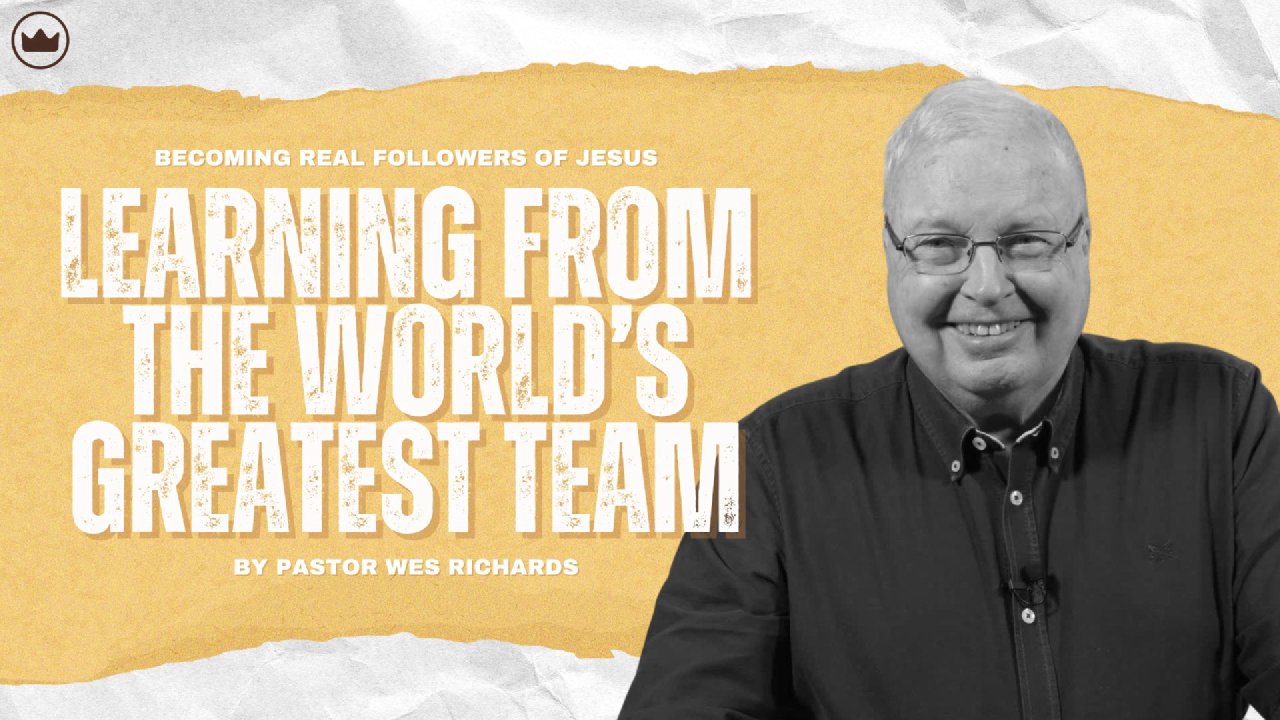You have more potential than you may realise. But one of the best ways to achieve actual fulfilment in your life is to be part of a team. Who would you say was the best team ever? In many areas of life, it has been great teams who have achieved more together than they ever would have done apart.
In church history it was a group of talented and dedicated U.K. Christians known as the Clapham sect who united to successfully campaign for the abolition of slavery and the promotion of global missions. The world’s most famous evangelist, Billy Graham, was a highly charismatic personality, but he freely admitted that he owed everything to God, his wife and a close team of associates who stayed together and supported him throughout their long lives.
Yet for all the effectiveness of so many great teams there is one that stands out above all others. John Maxwell wrote: ‘one could argue that Jesus constructed the most important team ever assembled. In less than one generation, the disciples of Jesus progressed from ignorant labourers to bold spiritual leaders in what is now the largest organisation in the world.’
The team that Jesus chose and trained to become history makers were a very mixed group of characters as we have been discovering over these past months. We have seen how easy it is to identify with them as they were very ordinary people just like us, each with their particular strengths and weaknesses.
For all the differences in their personalities and roles, these disciples who became the world’s most successful team, were united in key areas. They have much to teach us if we want to grow in our faith and as members of teams of disciples.
1. They had a personal encounter with Jesus (John 1:43-45; John 1:1-4, 14-16; Matthew 16; John 6:68-69; Colossians 2:7)
2. They committed to fully follow Jesus (Matthew 4:18-22; Matthew 19:27)
3. They needed to be developed as trained disciples of Jesus
4. They continued to be faithful witnesses of Jesus throughout their lives (Acts 12:2; Revelation 1:17-18; Revelation 5:9; Revelation 1:5-7)
Apply
1. They had a personal encounter with Jesus. Four fishermen, Andrew, Peter, James and John, all met Jesus along the shores of Lake Galilee. Matthew was called by Jesus while sitting at his booth as a tax collector. Philip and Nathanael also came into contact with Jesus (John 1:43-45). In one way and another Jesus entered the lives of each of the disciples and developed a close relationship with them over a three-year period. Jesus called this band of brothers ‘friends’, but they clearly understood that that Jesus was no mere man, but the Promised Messiah, God in human form (John 1:45; John 1:1-4). John went on to clarify that Jesus was the Word He was speaking of (John 1:14). When Jesus asked the disciples who they really thought He was, Peter stated he believed Jesus was the Messiah (Matthew 16). As opposition increased towards Jesus, many left him, but not his core disciples (John 6:68-69). What held them together was they were ‘rooted and built up’ in their personal faith in Christ (Colossians 2:7). That’s why they weren’t being blown all over the place. They knew Jesus for themselves. Being a true disciple then means far more than knowing about Jesus or even merely believing in Him at an intellectual level; it means that you must have a personal experience of knowing Jesus. Even if you would say that you are a Christian: do you really know the Lord in a personal way? Do you feel His presence? Do you know Him as your best friend who is always close by you? Are you confident to daily walk with Him because you are sure your sins have been forgiven because of your repentance and through Christ’s blood? Well this is what the Lord wants for you.
2. They committed to fully follow Jesus. They decided to wholeheartedly follow Jesus from the start (Matthew 4:18-22; Matthew 19:27). Peter and his brother and colleagues left their fishing careers, Mathew gave up tax collecting for the Romans, Simon the Zealot split from the terrorist group that focused on killing Romans. Each disciple left their old way of life behind. And that is what every true follower of Jesus must do. You cannot continue with an old sinful lifestyle, with old attitudes, with old forms of behaviour and friendships with those who mock God. You have to make a clean break to follow Jesus. God’s call on your life may also involve you changing from a previous career. But whether or not you stay or leave your chosen profession, what matters is that you die to an old way of life and that you choose to live God’s way and to be a faithful ambassador for Christ. A true disciple is much more than someone who attends church but someone who has consciously decided to prioritise following the example and teachings of Jesus. That's what the first disciples did but that was only the start of their story.
3. They needed to be developed as trained disciples of Jesus. Once Jesus had called individual disciples, He then brought them together as a team to form them in their characters and capabilities. And that’s what He did patiently, consistently, directly and ultimately very effectively. His training meant that the team of disciples: needed to stay close to their mentor and rabbi even when others had arguments and left; had to be prepared to accept correction, they weren’t too proud to learn and change; and needed to be ready to respond to new challenges. At first, Jesus sent them out to spread the good news of the kingdom of God in their home areas but finally he sent them out to make disciples throughout the whole world. Everything depended on them succeeding as a team. The responsibility for the whole future of the church and the growth of Christianity rested with this small, imperfect team that Jesus had raised up. There was no plan B. Today also the numerical and spiritual growth of the Christian church, locally and globally, primarily depends not on big events and public services, but with the training of groups of small groups of committed disciples who will in turn multiply faithful and fruitful disciples.
4. They continued to be faithful witnesses of Jesus throughout their lives. They obediently carried out their commission to spread the gospel wherever they went, no matter what difficulties they faced. And they were prepared to pay the ultimate price. We know of the fate of Judas who betrayed Jesus and hung himself, while the faithful James, the son of Zebedee, was executed by Herod in 44AD (Acts 12:2). Even though Peter was miraculously saved at that time from a similar execution and the Bible doesn’t give the details, numerous writers of the time (or shortly after) described his death as having occurred in Rome during the reign of the mad Emperor Nero in 64AD. According to tradition, St. Peter was crucified upside down because he felt unworthy to die in the same manner as Jesus. Although there are unreliable legends about the other disciples, there are strong traditions about their laying down of their lives for Christ. Russian Christians believe that Andrew was the first to bring the gospel to their land. Andrew also preached in modern-day Turkey, Asia Minor, and Greece, where it’s believed he was crucified. Tradition says that Thomas preached as far as India, where he was killed. Many churches in the Middle East and southern Asia, including Sri Lanka, also mention Apostle Thomas in their historical traditions as being the first evangelist to establish their churches. Philip likely had a powerful ministry in Asia Minor and in North Africa, where he was put to death. Matthew ministered in Persia and Ethiopia, where some believe he was killed. Of the other disciples who were reportedly martyred, Bartholomew had extensive missionary travels to Ethiopia, India with Thomas and to Armenia and Southern Arabia. James the son of Alpheus is believed to have ministered in Syria. Simon the Zealot ministered in Persia and was killed after refusing to sacrifice to a sun god and Matthias, the replacement for Judas, went to Syria. John is one of the only disciples who’s commonly thought to have died a natural death from old age. He was a church leader in Ephesus and is believed to have cared for Mary, Jesus’ mother, in his home. During a time of persecution under Emperor Domitian, John was exiled to the island of Patmos, off the coast of Asia where he wrote the last book of the New Testament. At the end of his life, John had many revelations of Jesus in heaven. He had a vision of:
- The conquering Christ: an awesome figure Revelation 1:17-18)
- The compassionate Christ: He saw a vast crowd of people gathered (Revelation 5:9; Revelation 1:5-6)
- The coming Christ: He foresaw that Jesus will return to earth in power and glory, overthrowing all evil, establishing His eternal kingdom and making all things new (Revelation 1:7).
For John the past, present and future was all about Jesus. Jesus was the centre and meaning and hope of everything. That’s why he and all the disciples had first followed Jesus and why they worked so effectively together as a team to shine his light in a dark world. We too need to encounter Jesus and live and work together as teams of real disciples to see Christ’s kingdom come on earth as it is in heaven.



